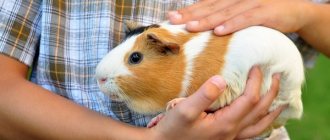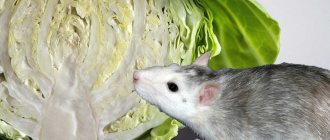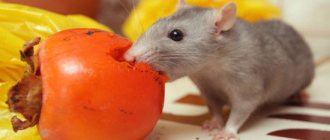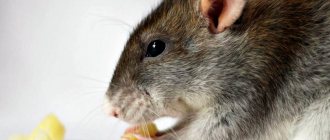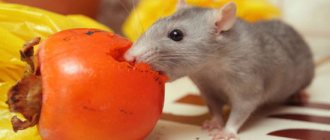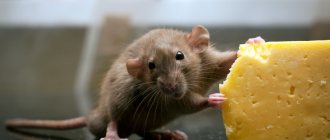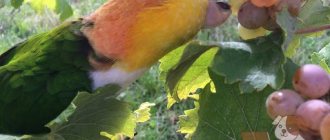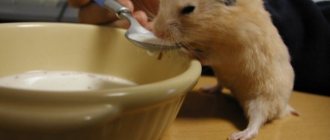What fruits and berries can be given to a decorative rat. Is it possible to give grapes to a rodent? Why are some fruits and berries prohibited from being included in the diet? How to properly plan your pet's diet. Useful and necessary products for rodents. What foods should you be careful of?
When we buy a pet rat, we create the most comfortable conditions for its life. We buy a cage, equip it with the necessary items and accessories, pay attention to it, and give it love and affection. We want to see a healthy and happy pet.
One of the most important conditions for health and quality of life is proper nutrition. The diet should include healthy foods that will provide the body with vitamins and minerals.
Of course, questions often arise about whether rats can eat grapes, berries, fruits and other treats unusual for rodents. Next, we will take a closer look at allowed and prohibited foods for rats.
How common food products can be dangerous
Technologies that are rapidly developing certainly give people many new opportunities, but unfortunately, they bring not only useful and correct changes, and this applies to food products.
We are all familiar with the range of exotic fruits that can be stored for years, all thanks to the means used for processing. Of course, they preserve the freshness of the juicy fruit, but one can only guess how these chemicals affect the body.
Housewives probably purchased rice from China, which very vaguely resembles a nutritious and healthy porridge. If watermelons are sold out of season, it is better to avoid them altogether, since they simply contain a huge amount of dangerous nitrates.
The range of dairy and fermented milk products also makes you think, since there is very little that is natural and healthy. A person tries to navigate such an assortment and chooses the healthiest food products, but even these can greatly harm the pet’s health.
Prohibited foods for rats
First of all, you need to understand that feeding the rat the same foods that the owners eat is strictly prohibited. As practice shows, it all starts with simple treats, first a piece of chicken, then a piece of apple, and before the owners know it, the animal will refuse its food and wait for another food.
There is nothing good about this, since besides obesity there are other dangers that end in the development of diseases. Under no circumstances, even as a “one and done” treat, should you give your animal smoked, pickled, salted, fried, fatty foods, sweets, confectionery, carbonated drinks, or alcohol.
Grain and cereals
The basis of the rodents’ diet is grains, which are distinguished by their value and benefits. For example, wheat, a very healthy product, but at the same time high in calories, it can certainly be present in the animal’s diet, but wheat must be supplemented with other grains. You can make a mixture of wheat and oats, rye, corn, buckwheat, rice, barley, millet, pearl barley, and millet.
Buckwheat is a low-calorie product and is considered dietary, but corn, on the contrary, is high-calorie. Oats may be present in small quantities as there is a risk that they will lead to fermentation. Regarding rice, it is better to give preference to unrefined or wild rice, since the purified product is low in nutrition.
For young animals, as well as weakened ones, they give porridge, you can give wheat or barley. But semolina is not suitable for feeding. Porridge is not healthy for adult animals and is excluded from the diet, but it can be given occasionally and in small quantities as a treat.
What do rodents like?
Biologists and professional deratizers (pest extermination specialists) agree that mice are more often “led” to delicacies of plant origin, while rats love animal products. But when a rodent has been hungry for a long time, it will eat whatever it finds. That is why at first it is difficult to determine who is in the house. In view of what has been described, employees of non-food industry enterprises resort to a trick - they use poisoned grain to destroy parasites. It’s cheap and works 100%, because pests have no other food.
Mice
Based on the above, the best mouse baits are:
- fresh baked goods - a fragrant wheat bun, muffin, gingerbread or a piece of soft white bread will attract the pest almost instantly;
- seeds - in the wild, mice eat grains and willingly feast on them in our homes;
- nut – as appetizing as grains;
- a slice of apple, pear, plum or peach - familiar fruits with a bright smell often become food for mice in the wild;
- peanut butter - nut paste has a pronounced aroma and smells fragrant for many meters.
Rats
Rats are practically omnivorous. They can be caught using any delicacy, but we recommend:
- lard is a product with a bright, spicy aroma that attracts rodents like a magnet;
- sausage - only high-quality sausage products will do; rats often refuse cheap ones, stuffed with chemicals;
- fresh meat - the specific smell that various parts of a chicken or pig carcass emit attracts pests;
- minced meat is an almost ideal bait for rats, better with the addition of onions;
- smoked fish is a very flavorful option that can catch the maximum number of rodents;
- vegetable oil – “fragrant” unrefined sunflower oil can be used in combination with a piece of bread.
Vegetables and greens
Vegetables and herbs are necessary for rodents and must be present in the diet, but there are also prohibited products from this category. For example, you should not give white cabbage, Brussels sprouts, red cabbage, cauliflower and Savoy, they cause fermentation in rats.
Radishes, legumes (peas, lentils, beans, beans), radishes, turnips are also prohibited, as they lead to gas formation. Sweet bell peppers are given with great caution and the body’s reaction is monitored, since it can lead to fermentation, also with green beans; they are given only in boiled form.
But what foods can and should be given are zucchini, carrots, pumpkin, zucchini. You can give cucumbers, but only in small quantities and rarely, otherwise they can cause diarrhea.
Raw eggplants contain solanine, which leads to rodent poisoning, so the product is only acceptable in boiled form, just like artichokes. Potatoes are also not recommended.
Due to the acid content, you should not give tomatoes, sorrel, rhubarb, spinach, they irritate the walls of the stomach. Beets can cause diarrhea, so give them in small quantities and with great caution.
Greens are very important for animals, they saturate the body with vitamins and microelements, help the gastrointestinal tract function properly, but just like vegetables, not all greens are healthy.
It is prohibited to give wild garlic, onions, and garlic; they lead to irritation of the gastrointestinal mucosa because they contain phytoncides. Parsley, dill, celery, cilantro, and basil are suitable for the daily diet. You can also give leaf salads that do not have bitterness.
Store-bought treats
Store-bought treats cause far fewer problems. Because specialized products are made from ingredients that are completely safe for rats. Also on the packaging is all the necessary information - how to store, under what conditions, how much to give to the rat and at what interval. The following store-bought treats are most popular among rat owners:
- Crispy Little One sticks with puffed rice, peanuts and walnuts. The composition also contains wheat, oats, millet, and corn. The delicacy is enriched with a vitamin and mineral complex.
- Multi-colored vegetable and alfalfa balls from JR Farm. The color will tell you what the delicacy is made of. Red balls are from beets, orange are from carrots, green are from alfalfa, yellow are from corn.
- Mealworm ONTO. Rich in protein and fats. Just 1 piece is enough to pamper your pet. Rich in vitamin B12, necessary for normal hematopoiesis. Strengthens the health of the liver, gastrointestinal tract, and also improves immunity.
- Branches of the Kuban apple tree. They have a pleasant taste and aroma. Designed for regular grinding of growing teeth. Other manufacturers offer similar treats for rats (currant, viburnum, willow, birch branches).
- fruit crackers . It is based on a wooden stick and also has a clamp for installation inside the cage. The baked sticks consist of a mixture of cereals, apple and apricot. Contains minerals and vitamins A, D3. Free from artificial colors and flavors. They fill your pet with energy and improve their mood.
- Drops for rodents SANAL. They contain honey and milk, so rat owners are afraid to buy them for their pets. And it’s completely in vain - all ingredients undergo multi-stage purification, during which allergens are completely destroyed. Also contains extracts of fruits and vegetables, vitamins B, C, and minerals (copper, potassium, zinc, manganese).
Many store-bought treats are sold with the general label “for rodents.” Therefore, before purchasing, it is better to make sure that the treat is suitable for rats. The necessary information can be obtained from the seller or on the back of the package.
This is not a complete list of store-bought treats. If desired, you can find other equally tasty and healthy delicacies for decorative rats in pet stores.
Fruits
Citrus fruits contain a lot of acid, so they are not included in the diet. Very rarely and only in small quantities it is allowed to treat a very sweet tangerine. Regarding berries, they should be divided into sweet and sour; the latter should not be given.
For example, a very healthy cranberry, which is rich in vitamins and microelements, can harm a rodent. Also with cherries and cherries, give preference to the first product.
It is forbidden to give rodents seeds of citrus and fruit trees, since they are poisonous to animals. Fruits and berries have special properties that you definitely need to pay attention to.
For example, plum can act as a laxative, but chokeberry, on the contrary, strengthens, hawthorn, which is used as a medicine. Pear can cause fermentation. Regarding watermelon and melon, small quantities are possible, but only in season; at other times they are full of nitrates. Dates are very sweet, so it is better to avoid them.
Now let's look at grapes. This product may be present in the diet, for example, sultanas, but remember that only in small quantities and occasionally.
Dairy
Most adult animals are lactose intolerant, so regular milk is not given to animals. But fermented milk products are very healthy, but only if given correctly and in moderation. It is forbidden to give sour cream, cheese, cream, as they are very fatty.
You can give cottage cheese, kefir, fermented baked milk, yogurt, yogurt. Give only natural yogurt, without added sugar, preservatives, flavorings, pieces of fruit, all these additives are harmful to the animal. The fat content should be 2-4%, but low-fat products will not be beneficial.
Quality grapes - what are they?
Many owners are very mistaken in believing that a decorative rat should and can eat absolutely everything. Including products that are far from fresh. When choosing grapes, you need to focus on fresh bunches. Rotten berries will bring neither benefit nor pleasure to a rodent. When choosing grapes, pay attention to their appearance.
The best solution is to provide grapes grown in environmentally friendly conditions and without chemical treatment. Such berries can be collected at your summer cottage or bought from a small farmer at the market.
If wasps are constantly flying around a stand with grapes, this is an indication that it has not been treated with harmful chemicals. You can safely buy such berries. If you purchased them in a store, then before giving them to your pet, pour boiling water over them several times.
Animal proteins
Animal proteins should also be present in the rodent's diet.
They should be given 2 times a week, the following products are allowed:
- Lean meat, only boiled.
- Hard-boiled eggs, quail or chicken.
- Seafood.
- Dog and cat food, but only high quality.
You should choose lean meat, chicken, turkey, beef, and game. It is better to avoid pork altogether. If you give the yolk, you need to grind it with water so that the rodent does not choke.
Before cooking beef, you need to soak it in water for 2-3 hours. But chicken meat needs to be boiled in several waters to get rid of harmful substances.
Special cases
In some cases, it is allowed to feed animals with baby food, which is sold in jars in the form of puree. You can also treat them with diet cookies as a treat.
It is forbidden to give tea and coffee, but decoctions of medicinal herbs can be given only on the recommendation of a doctor. Jam, chips and sweets are not given under any circumstances.
In the table you can see the permitted and prohibited products, which will help you properly organize the diet of your decorative rat.
| Product | Allowed | Allowed in small quantities | Forbidden |
| Cereals, cereals | Wheat, barley, rye, millet, rice, flaxseed. | Corn, wheat grits, oat flakes, oats, porridge. | Semolina |
| Vegetables, greens | Carrots, zucchini, zucchini, pumpkin, squash, parsley, dill, cilantro, basil, Chinese cabbage, celery, Iceberg lettuce. | Broccoli, cucumber, beets, tomato. Boiled: green beans, artichoke, eggplant. | White cabbage, Brussels sprouts, cauliflower, red cabbage, Savoy. Turnips, artichokes, potatoes, eggplant, peas, beans, beans, lentils, rhubarb, radishes, sorrel, radishes. |
| Boiled mushrooms | White, champignons, boletus, boletus. | ||
| Fruits, berries | Apple, strawberry, cherry, currant, raspberry, apricot, mango, avocado, peach, nectarine, grape, cherry, blueberry. | Pear, sweet tangerine, banana, plum, cranberry, kiwi, gooseberry, lingonberry, blackberry, melon (seasonal), watermelon (seasonal), ripe persimmon. | Citrus, non-seasonal fruits |
| Nuts, seeds | Watermelon seeds, apple seeds. | Peanuts, hazelnuts, pine, walnuts, cashews, coconut. | Almonds, citrus seeds, fruit seeds. |
| Dairy | Kefir, fermented baked milk, yogurt, natural yogurt, cottage cheese. | Cheese, sour cream, cream, butter, condensed milk. | |
| Animal proteins | Lean meat, offal, seafood, boiled eggs, boiled fish, dog and cat food. | Pork, lard, smoked meats, sausages. |
Remember that new foods are introduced into the diet gradually, give a very small portion and monitor the reaction, since animals may have an allergic reaction.
How to make your own treats
To pamper your pet, it is not at all necessary to resort to the help of specialized store-bought mixtures. You can prepare equally tasty and healthy treats yourself, using available ingredients. Here are some recipes:
- Porridge with additives . To prepare, you need to cook any porridge in water without using salt and sugar. After that, add some tasty treats: seafood, dried fruits, vegetables. It is also allowed to add a couple of drops of vegetable oil to the dish, preferably olive or flaxseed.
- Fruit grain stick . To prepare, you will need to add a mixture of baby purees from any fruit (for example, apple and pear) to a small bowl. After that, add a little grain, peeled chopped nuts and seeds until a thick consistency is obtained. Then form sticks from the resulting “dough” and send them to dry in the oven at a temperature of 75-80ᵒC.
- Fermented milk mixture . Not subject to long-term storage. Therefore, you need to cook it at once. The preparation method is simple - first you need to pour fermented baked milk, yogurt or Varenets into a small bowl. Then add a little low-fat cottage cheese until you get a dough-like consistency. It is also allowed to use sour cream as a base, but not more than once a month.
- Vegetable cookies . The dish is based on finely chopped vegetables (carrots, zucchini, pumpkin), pre-squeezed. Next, you will need to add some grain to the vegetable mixture. Then mix everything thoroughly and pour in the egg. From the resulting mass you need to form cakes or balls and send them to dry in the oven at a temperature of 50ᵒC for at least 12 hours.
Some rats have allergic reactions to egg whites. Therefore, it is better not to offer treats that contain eggs to rodents prone to allergies.
Despite the fact that it takes much more effort and energy to prepare treats for rats on their own, when cooking at home, the rat owner can be confident that the ingredients are natural. And accordingly, the pet will not be poisoned and will not develop stomach problems.

